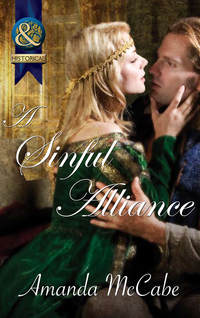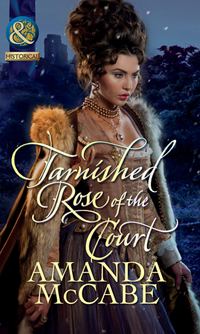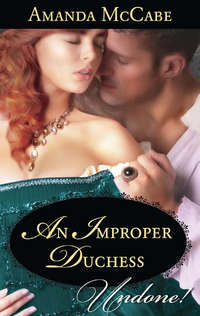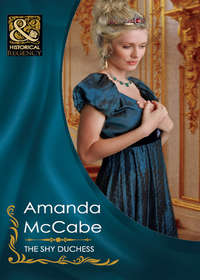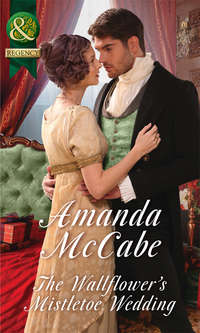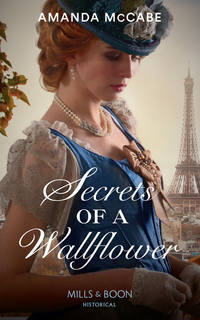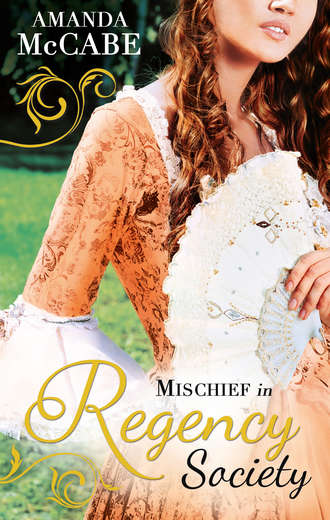
Полная версия
Mischief in Regency Society: To Catch a Rogue
Clio laughed. “I’m not afraid of the duke!” She brandished her staff, a tall gold-and-green, ribbon-wrapped pole topped with yet another snake, a puffed-out cobra. “I shall just turn him to stone.”
“If only it was always that easy to deal with men,” Calliope muttered. “What are Thalia and Father dressed up as?”
“Thalia is Euridice, and Father is Socrates, of course.”
“With his cup of hemlock?”
“Hmm, yes,” Clio said. She stepped up to Calliope’s mirror to make sure her snakes were straight. “Or rather a cup of lemonade with sprigs of mint floating in it. We shall have to make sure he doesn’t bore everyone in sight at the ball, for he is already wandering around the drawing room, declaiming to the furniture.”
“If there is no youth to corrupt, a hassock will do. Is that a direct quote from Socrates as he drank the hemlock? If not, it should be.” Calliope watched as Mary finished the curls and ribbons and carefully lowered the helmet over her creation. “How do I look, Clio?”
“Perfect, as always. Surely there can be no finer Athena,” Clio answered. “Too bad Cory’s pet owl died last year, it would have made an excellent prop.”
“A prop that would fly off and get lost in the chandeliers. I told Cory a barn owl didn’t want to be a domestic pet. This one here will do very well.” Calliope hoisted up her shield to display the enameled owl on its face. “Shall we go?”
Athena, after all, was never late to battle.
The Duke of Averton’s grand townhouse, Acropolis House, was lit up like the Colossus of Rhodes set down in the middle of London. Even from their place far back in the long line of carriages, Calliope was dazzled by the amber glow.
Acropolis House was not the usual among aristocratic townhouses. No plain white stone, no mellow red brick set in tidy rows for the duke. No. Acropolis House was like a vestige of medieval London, a fortress of solid, dark rock, turreted and many-chimneyed, the shutters of all its mullion windows thrown open to let out all that candlelight. It was set back in its own small garden, surrounded by high walls. The iron-tipped gates were usually closed and chained tight, but tonight they were open to admit the flood of carriages, the gawking curiosity seekers. As their own conveyance entered the gates, Calliope peered out to find leering gargoyles staring back at her. They topped the gates and lined the walls, discouraging the curious.
Calliope shivered and drew back into her shawl.
“You’d think the duke was Charlemagne,” Thalia sniffed. “And look at that obelisk over in the corner of the garden! Twenty feet high at least.”
“Terribly pretentious,” their father agreed. But Calliope thought she saw a tiny glint of envy in his eyes as he peered at the towering obelisk. “I wonder where he obtained it? The hieroglyphs are quite fine.”
“Somewhere he had no business being, I’m sure,” Clio said tartly.
Calliope did not answer, for their carriage at last rolled to a halt before the massive, iron-bound front doors and it was their turn to alight at last. The duke’s footmen, clad in chitons and sandals for the evening, hurried forward to assist them. Calliope held tight to her spear and shield as she followed Clio’s glittering green train into the very lair of the Duke of “Avarice”.
The foyer, where they surrendered their cloaks to more classically garbed servants, was a soaring, octagonal space with black-and-white marble floors and walls inlaid with dark wood panels. Tall, wrought-iron candelabras provided the only light, flickering on tightly closed doors, on Minoan frescoes of slim bull jumpers, on suits of armour, and bristling maces and swords, and on two massive Assyrian lions guarding one of the doors, as if ancient Persia rested just beyond that portal.
“My, what eclectic tastes our host has,” Clio muttered, as they joined the line of revellers making their way up the twisting staircase towards the ballroom.
“To say the least,” Calliope answered, eyeing the treasures tucked in niches. Sculptures, vases and amphorae, even Byzantine icons. They were all impressive pieces, beautifully restored, elegantly displayed. Yet Calliope noticed something odd about them all. Unlike her father’s own antiquities, which depicted the gods and Muses, wise scholars, merry parties, the finest of human endeavours, these pieces all had some element of violence about them. Battles, fights, sacrifices. Even the icons depicted martyred saints: Catherine and her wheel, Sebastian and his arrows, and St George driving his sword into the dragon.
Calliope turned away from them, disquieted.
“Or perhaps not so eclectic as all that,” Clio said quietly. “Murder and bloodletting are sadly a part of every civilisation. The duke seems bent on reminding us of that fact.”
“Indeed he does,” Calliope said.
The higher up they went, the more the noise of the party grew, a hum that expanded into a vast river of sound as they spilled into the ballroom. Calliope usually had little use for balls and routs that earned the coveted society accolade of “dreadful crush”. There was little real conversation possible amid such clamour, just overheated air and far too much noise. Tonight, though, she welcomed the crowd. It seemed a bright haven of normalcy in this very bizarre house.
The ballroom was not as eerie as the foyer and staircase, but was merely a large, bright space with white walls and gleaming parquet floor. The domed ceiling was painted with an elaborate fresco of an Olympian banquet where, thankfully, no one was killing anyone else. Around the walls were more ancient frescoes, no doubt snatched from some Italian villa, scenes of cosy domestic life. Marble statues were interspersed with the paintings of scantily clad nymphs, satyrs, gods and goddesses that echoed the costumes of the revellers.
As Calliope expected, there was no one quite like Clio among the crowds who were forming a dance set or milling among the statues, sipping champagne and nibbling on lobster patties and mushroom tarts—rather unGrecian hors-d’oeuvres, Calliope thought. There was a Minotaur, hulking and hairy, flirting with Ariadne and her ball of twine; several Achilles and Hectors; some giggling Aphrodites with various versions of Ares and Cupid. Their father soon joined a cluster of other philosophers in the corner to argue about how man could examine his reasons to be in harmony with the cosmos, and Thalia was swept into the dance by an Orpheus, their respective lyres deposited with a footman.
Calliope tucked her spear under her arm and reached for a glass of champagne from a passing servant’s tray. It was the finest quality, of course, a rich, tart golden liquid that blended well with the exotic setting, the swirl of music and laughter. For a moment, she felt transported from London, from everyday life, and lifted into some phantasmagoric fantasy world where reality was gone, vanished amid the sea of masks.
She held the glass up to the light, wondering if the enchanting little bubbles concealed some hallucinogenic elixir, some Shakespearean “love in idleness”.
“Is something amiss with the champagne, Miss Chase?” an amused voice asked.
Calliope whirled around to find their host standing behind her, a smile on his lips. He was as unusual as his house, dressed as Dionysus with a leopard skin over his chiton, his long, red-gold hair loose over his shoulders. Dionysus, the god of wine and revels. Of maddened followers who tore their victims limb from limb in their bloodlust.
Or stole treasures that did not belong to them.
Calliope stiffened under his intense regard. “Not at all, your Grace. The champagne is excellent, as are your arrangements. Your house is most—extraordinary.”
“That is high praise, indeed, coming from a Chase. For you are all experts in art and antiquities, are you not?”
“I would not say expert. We are all students, in our own ways.”
“And is your interest strategic warfare?” he said, gesturing towards her Athena shield.
“Or perhaps olives,” she said flippantly.
“Ah, yes. For it was Athena who ordered olive trees planted on the hills of her Acropolis. The very foundations of her followers’ prosperity.”
“Until rapacious thieves ordered them dug up, in search of buried treasure. Now glorious Athens is just a dusty little town. Or so I hear.”
The duke laughed. “My dear Miss Chase, how kind of you to defend a people you do not even know! Yet if your so-called rapacious thieves did not dig on the Acropolis, think what would be lost to us. So much beauty and learning. Is it better that these things should moulder in the ground, disintegrating in the care of people who have no regard for them?”
Calliope grudgingly had to admit that he said nothing she herself had not argued. But his smug tone of voice, his patronising smile, made her want to quarrel with him. To slap that expression off his face. She shrugged, and drained her glass of champagne.
“Come, Miss Chase, let me show you one of the treasures that would have been lost for ever,” he said, taking the empty glass from her hand.
“The Alabaster Goddess?” Calliope asked.
“Are you trying to gain an early glimpse of the masterpiece of my collection? No, she will be revealed later. At the right moment.”
“One last chance for her to be admired before she is shut away?”
“She is hardly a cloistered nun. She is being taken to a place where she can be properly protected, unlike other antiquities in our fair city of late,” he said. He took her arm in a light clasp, steering her around the edges of the crowd, calling jovial greetings to the noisy guests.
Calliope had to grit her teeth to resist the urge to pull away, to run from him. When Lord Westwood took her arm just so at the British Museum, it was warm and easy. The duke’s touch felt like a cold shackle. She pinched her lips together and walked faster as they moved past candelabra and frescoes.
He led her to the end of the room, where tall glass doors led on to a dark terrace. The crowd was lighter here, the air cooler. Calliope almost feared he meant to lead her out on to that terrace, away from the noise and light, and then—then what? Push her off to the stone walkway far below?
Calliope almost laughed aloud at her own foolishness. He did not know of her plans to keep his Alabaster Goddess safe, to prevent her from being stolen like all those other lost pieces. To keep her from disappearing into Yorkshire, too, if she could help it at all. He did not know of her great aversion to him, of how frightened she was by his behaviour towards Clio at the museum. He couldn’t know any of that.
Nevertheless, when his clasp on her arm loosened, she wasted no time in moving away.
“What do you think of this, Miss Chase?” he asked, gesturing towards another statue displayed between the glass doors.
Calliope forced herself to turn her wary attention from him, to take in a deep breath as she examined the piece. Art, as it always did, slowly worked its magic on her senses. The duke and the crowd subsided to a whisper.
It was beautiful, of course, as everything in the duke’s collection was. Beautiful in a strange, violent way. This depicted not a battle or brawl, but Daphne at the very moment she was transformed into a tree by her father Peneus, after Daphne called on him to stave off Apollo’s unwanted advances. She was running, her body twisted as she looked frantically back over her shoulder. Her legs and upflung arms were turning to branches. Her long hair flowed back like a river.
“What do you think, Miss Chase?” the duke asked.
“It is lovely. The sense of movement, the way the flesh of her arms transforms just here into wood—extraordinary.”
“Exactly so. It is a Roman copy, of course, but still its great beauty is evident. And her face looks rather like your sister, does it not?”
Startled, Calliope stared up at the duke, shaken from the reverie the Daphne invoked. He did not watch her; all his attention was on Daphne’s cold, carved face. He reached out one fingertip to touch her cheek, sliding a slow caress along the angle of her cheekbone.
It did look like Clio, Calliope had to admit. With that hair, and the sharp, thin angles of the face and bare shoulders. And that made his rapt attention all the more chilling.
“She has the same independent spirit, you see,” the duke murmured. “But in the end, one way or another, she will belong to the gods. Run though she will.”
Calliope’s throat was dry, and she knew she had leave, to find Clio. She slowly backed away from the duke, who still seemed lost in his own world. His own fantasies of poor Daphne.
“Excuse me,” Calliope murmured. “I see someone I must speak to.”
She hurried back into the midst of the crowd. There seemed to be even more people packed into the ballroom than before, knots and skeins of humanity laughing and drinking, oblivious to any nightmarish quality this house might hold. Yet there was no Clio anywhere, not even a glimpse of her shimmering green silk. Thalia was still dancing, as she probably would do all night. Their father was nowhere to be seen. Probably he had gone off to the card room with his philosopher friends, continuing their discussion over a hand of vingt-et-un. She did see Emmeline, dressed as the Delphic Oracle, talking with one of her assigned possible thieves. She gave Calliope a small nod and smile. All was going as planned in that corner.
If only Calliope could say the same! She so hated when her plans went awry. But then, what could she expect from someone like the Duke of Averton? He was a strange one, to say the least, and there could be no predicting what might happen in his house. She had to stay calm. Remember her goal—to protect the Alabaster Goddess.
And surely in such a vast crowd Clio was safe enough. The duke couldn’t hurt her here, couldn’t turn her into a tree. He probably couldn’t even find her. Still, Calliope would feel better if she could talk to her sister, warn her to be on her guard.
Hoisting her shield higher, Calliope threaded her way through the ballroom. Several friends greeted her, but there was no Clio.
“Where are you?” she muttered, straining on tiptoe to see over the crowd.
“I am here, grey-eyed Athena,” a voice said, slightly muffled, close to her shoulder.
Half-fearing the duke had crept up on her again, Calliope turned. There was no Dionysus, though. It was Hermes, in his winged sandals and helmet, muscled arms bare in a white chiton. The visor of the helmet was down, but Calliope recognised the unruly dark curls that escaped its golden confines. She also recognized Hermes’ scent, the clean smell of citrus soap with something darker, more complex and alluring, underneath, like cinnamon or sunshine, salty sea air.
A strange sense of relief flowed over her. She was not alone in this crowd any longer! “My eyes are brown, Lord Westwood,” she said, resisting the urge to hug him, to cling to those strong arms. It was surely just another measure of how bizarre this evening had become that she was so very happy to see him.
“Always so logical,” he said, pushing back the visor to reveal his smile. “How did you know it was me?”
“Your soap.”
“My soap?”
Calliope shook her head. “It’s not important. Have you by any chance seen my sister?”
“Miss Clio? I don’t think so, but then anything is possible in this crowd. What is her costume?”
“Oh, you couldn’t miss her. She is Medusa, in a green-and-gold gown, with snakes on her headdress.”
“Snakes? Never say she brought reptiles in here! But then, I would not really be surprised. You Chases always do things in your own fashion.”
Calliope had to smile in spite of herself. “I dare say Clio might have brought real snakes in, if she didn’t know how I dislike them. But she only has cloth snakes. With green glass eyes.”
“I fear I’ve seen no Medusas at all. Is something amiss?”
“No, I just need to tell her something. I’m sure I will see her later. Unfortunately, I can glimpse little in this crowd.”
“Did I not predict it would be a ‘dreadful crush’?”
“You did. Surely what every hostess most desires.”
“Or host.” His expression hardened. “I saw you were speaking to Mr Dionysus.”
“For a moment,” Calliope answered cautiously. “He was showing me a statue of Daphne.” The memory of the duke’s hand on that marble cheek made her feel cold all over again, and she trembled.
“Are you cold?” Lord Westwood asked solicitously.
“Just a bit. Though I’m not sure how I could be, it’s so overheated in here!”
“Such a mausoleum as this place can never be truly warm. Come, Miss Chase, dance with me. I think the exercise will do us both good.”
Calliope glanced towards the dance floor to find a new set forming. Emmeline was there with Mr Smithson, as was Thalia with the strange Minotaur. Still no Clio. Yet surely a dance would do her good. Take her whirling thoughts from the duke and his bizarre actions, the Alabaster Goddess and the Lily Thief, and warm her chilled bones. Westwood was right—this place was a mausoleum. Only music and dancing could bring it to life again.
Especially a dance with Lord Westwood, for surely no one could be more alive than he was. His cognac eyes, the golden glow of his smooth skin, fairly breathed youth and vitality and strength. After the duke’s brief, cold touch, the breath of his corruption, she craved that heat. Yearned for it. Even if it was with Westwood.
But he was not Westwood tonight. He was Hermes. She was Athena. And this was not an ordinary London ball, but an Olympian revel. For the length of one dance, anyway.
“Thank you, Lord Westwood,” she said. “I would be happy to dance with you.”
Chapter Eight
Clio glanced back over her shoulder as she tiptoed along the narrow corridor. Empty. No one followed her. Probably they did not even notice her absence from the ballroom, not in such a crush.
Perfect.
It was silent here, unlike the roar of music and shallow conversation. So quiet it was almost like a cave, lit only by a few lamps built to resemble flickering torches. The shifting light touched the dark, linenfold panelled walls, the low, carved ceiling and the gilt-framed paintings, making them glitter and waver as if alive.
Clio paused to slip off her heeled shoes, peering closer at one of those paintings. It was a modern creation, an oil of the Minotaur in his labyrinth. A great, hulking, hairy beast with red, fiery eyes, lurking in a dark space much like this corridor. All around him were smoking torches, stone walls painted with strange, glowing symbols.
The duke must feel some affinity for this particular myth, Clio thought as she studied the scene. She had seen several depictions of it tonight, in stone as well as paint, and in that one odd costume in the ballroom. Well, she knew that everyone had within them a dark heart—a Minotaur. And that sometimes a person had to venture into the labyrinth to confront that side of themselves. To confront the truth.
Was that not what she was doing now?
Clio turned her back on the Minotaur and hurried on stocking feet to the end of the corridor where there was a small, winding staircase, a miniature of the grand one soaring up from the foyer. The duke was being very cagey about the Alabaster Goddess’s whereabouts tonight. But his servants were not all so secretive. Clio was able to persuade a footman to tell her where Artemis waited.
At the top of the stairs ran a long gallery, almost the entire length of the front of the house. Its bank of windows, uncovered, looked out at the front garden and the street beyond, the open gates that still admitted latecomers to the ball.
The gallery was dotted with tall, heavy iron branches of candles, half of them unlit. No doubt waiting for the “grand reveal” after supper, when they would spring to life as if by magic. Right now the light was dim, falling only in shimmering bars on some of the treasures displayed there, leaving others in darkness.
Clio found herself holding her breath as she crept along the gallery, peering right and left at all the wonders jumbled together. Her father’s friends were all great collectors and loved to show off their prizes, so she had grown up surrounded by beautiful antiquities. But this—this was something else entirely. A cabinet of curiosities such as she had never seen before.
The gallery almost resembled a warehouse, it was so thick with objects. Ancient stone kouros, stiff and precise, their empty eyes staring back at her. An Egyptian sarcophagus, with traces of bright paint still clinging to its surface. Bronze warriors; marble gods finer than any she had ever seen; cases full of gold Etruscan jewellery, lapis scarabs, tiny cat mummies in gold coffins, jewelled perfume bottles. Steles propped against the walls. Shelves of vases, kraters, and amphorae. All jumbled together, just to serve one man’s vanity.
Clio frowned as she remembered the duke at the British Museum, pressing so close to her she was overcome by his spicy cologne. That strange light in his green eyes…
She shook her head, her satin snakes trembling. She couldn’t think about him now. She didn’t want to think about him ever.
At the end of the gallery, alone in a pool of candlelight, was an object covered in a drape of black satin. Only a bit of the separate coral-coloured marble stand was visible. Clio approached it carefully, half-expecting some sort of trap, some alarm. All was silent, except for the whining hum of the wind past the windows. She reached out and carefully lifted an edge of the drape, peering beneath.
“Oh,” she sighed. It was really her. The Alabaster Goddess. Artemis in her solitary glory.
The statue was not large. It was easily dwarfed by many of the more elaborate creations in the gallery. But she was so perfectly beautiful, so graceful and elegant, that Clio could understand why she had become such a sensation.
Carved of an alabaster so white it seemed to glisten, almost silver, like a first snowfall, she stood poised with her bow raised, an arrow set to fly. Her pleated tunic flowed over the curves of her slender body as if caught in a breeze, ending at mid-thigh to reveal strong legs, tensed to run. Her sandals, the little, ribbon-laced shoes every lady had copied this Season, still bore bits of gold leaf, as did the bandeau that held back her curled hair. A crescent moon was attached to the band, proclaiming her to truly be the Goddess of the Moon. Her gaze was focused intently on her prey, not heeding mortal adulation.
Clio stared up at her, enthralled, as she imagined the Delian temple where this goddess once resided, where she once received her worship from true acolytes of the moon. Not just ton ladies with their “Artemis” coiffures.
“How beautiful you are,” she whispered. “And how sad.”
Clio reached out to gently touch Artemis’ foot in a gesture of silent sympathy. As she did, she noticed that the goddess stood on a modern wooden base, a thick block of mahogany. A thin crack ran along its centre. She leaned closer, trying to see if that crack was a fault or deliberate. It seemed such a strange perch for a beautiful goddess.
“Ah, Miss Chase. Clio. I see you have discovered the whereabouts of my treasure,” a voice said, quiet, gloating.
Clio ducked away from Artemis, spinning around to find the duke standing halfway along the gallery, watching her intently.
Even in the dim light, his eyes gleamed like the snakes in her headdress. He smiled at her gently, shrugging his leopard pelt back from his shoulders. Clio thought of that scene from the Bacchae, where Agave, under the evil influence of Dionysus, tore her son Pentheus to death, thinking him a lion. Then she carried his severed head back home, still delusional.
He moved closer, light and silent, as if he was a leopard himself. “She is beautiful, is she not?” he said, still so quiet. So soft. “I knew you would be drawn to her, as I was. She is quite—irresistible, in her mystery.”
Clio edged back against the goddess. She had indeed found Artemis irresistible. So much so that she let her guard down, and that was not like her. As the duke came closer, she reached behind her, her fingers just touching Artemis’ cold sandal. She slid her touch down, finding that strange crack in the wooden base…


